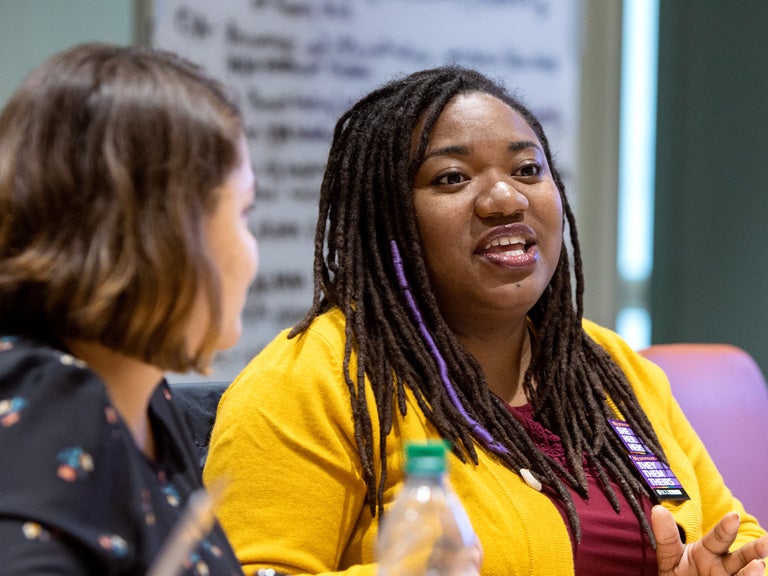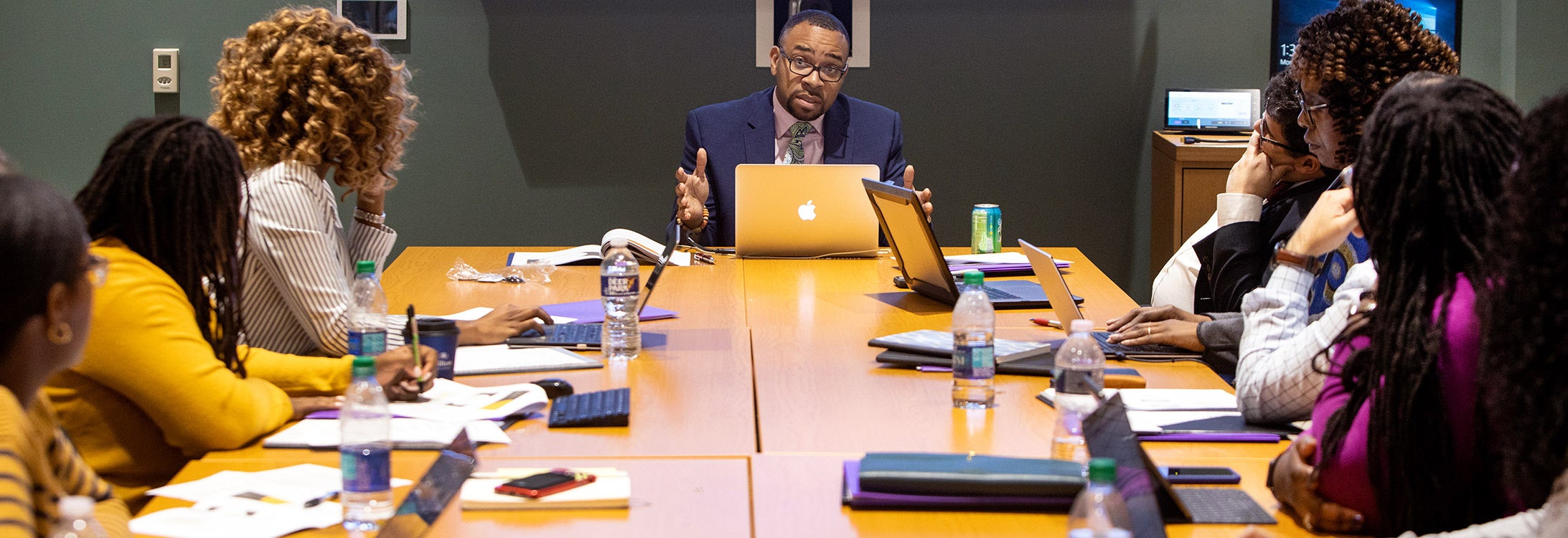MENTORING MINORITY FACULTY
Minority faculty visit Brody for mentorship, publishing guidance
Seven underrepresented minority in medicine (URMM) junior faculty members from family medicine departments across the nation spent several days this week at ECU’s Brody School of Medicine for mentorship in scholarship and manuscript writing.
The Nov. 3-5 writing skills workshop for underrepresented minorities in medicine was part of a yearlong faculty development program and was funded with a grant from the Society of Teachers of Family Medicine Foundation (STFM) with support from Brody and the University of Utah Health Sciences Campus.
Groups that the Association of American Medical Colleges (AAMC) considers underrepresented minorities in medicine are black or African American, Hispanic or Latino and Native American. According to the AAMC, only 4% of full-time faculty are URMM, which is far below these minorities’ representation in the general population.
During their visit, the scholars toured the Health Sciences Campus, built professional bonds with each other and gleaned knowledge from workshop leaders including Dr. Kendall Campbell, Brody’s senior associate dean for academic affairs, associate professor of family medicine, director of Brody’s Research Group for Underrepresented Minorities in Academic Medicine and one of the event’s organizers.
“This two-day experience has been part of a yearlong mentoring process in essential writing skills, in how to contribute to the body of knowledge in medicine and in how to develop a reproducible path to scholarship and promotion,” Campbell said. “Our goal is that they leave here with a framework for publishing at their home institutions and producing scholarly products.”
Dr. Maria Harsha Wusu, assistant professor of family medicine at Morehouse School of Medicine in Atlanta, said the workshop inspired her to propel her academic career to a new level.
“The STFM URM Writing Fellowship Workshop provided a safe space where I could let down the armor I often wear as a black woman in academic medicine,” Wusu said. “As a group of peers and mentors of color, we were able to discuss shared challenges in a way that validated our individual experiences in the context of systemic problems and moved towards solutions.”
Campbell said the workshop was successful based on the ideas that were shared and the guidance that helped leaders and participants form a strong network.
“The main takeaway for the group is the ongoing need for early career family medicine academic faculty mentoring and development around writing and scholarship,” he said. “Another important takeaway is the need to assist academic medical centers in effectively addressing the unique challenges that underrepresented minority faculty in academic medicine confront that impact manuscript writing and scholarship.”
Along with Wusu, other scholars included Dr. Kari-Claudia Allen, assistant program director of the family medicine residency program for Palmetto Health-University of South Carolina School of Medicine; Dr. Octavia Amaechi, clinical educator and AHEC assistant professor at Medical University of South Carolina; Dr. Tanya Anim, assistant professor of family medicine at Florida State University College of Medicine; Dr. Krys E. Foster, clinical assistant professor in the Department of Family and Community Medicine at Thomas Jefferson University Hospital; Dr. Yury Parra, HIV curriculum director and assistant professor of family medicine at the University Hospital for Albert Einstein College of Medicine; and Dr. Juan Robles, assistant professor of family and social medicine at Albert Einstein College of Medicine.

Drs. Yury Parra and Kari-Claudia Allen participates in a discussion during a Society of Teachers of Family Medicine Foundation-funded workshop for underrepresented minority faculty in medicine.
“It is compassion that makes the work of a family physician meaningful, but it is research and evidence-based practice that gives our work a standard of quality across the specialty,” Allen said. “This workshop gave junior faculty, who are already crafting a myriad of innovative and creative projects, a deep dive into how to translate that work into a body of evidence that will move our specialty forward.”
Campbell led the workshop along with Dr. José Rodríguez, interim associate vice president of health equity and inclusion and professor of family and preventive medicine at the University of Utah Health in Salt Lake City, Utah; and Dr. Judy Washington, associate residency director ofOverlook Family Medicine Residency Program at Atlantic Health System in Summit, N.J. Campbell, Rodríguez and Washington are all members of STFM’s Minority and Multicultural Health Collaborative, which aims to increase the number of underrepresented minority faculty in academic family medicine, including those with leadership positions.
“Relationship building was core to our time together as these relationships can impact isolation and networking for early career minority faculty,” Campbell said. “I am thankful for the STFM foundation for funding this experience and for ECU and the Brody School of Medicine for their role in helping make this workshop a success.”
Wusu said the three leaders provided the scholars personalized and focused attention based on their goals and interests.
“They embodied every level of mentorship and were so invested in our success that they were willing to adapt the workshop in real time to meet the needs of the individual participants,” she said. Campbell said hosting the event aligns with Brody’s mission to provide opportunities in medical education, particularly in family medicine and geared toward underrepresented minorities.
“Brody is a national leader in family medicine, receiving recognition from the American Academy of Family Physicians for being the number one producer, percentage-wise, of graduates in the state of North Carolina – and number two in the United States – who choose family medicine as a career,” Campbell said. “It’s a natural fit that we contribute to producing outstanding family medicine scholars.”
Dr. Mark Stacy, dean of Brody and vice chancellor for ECU health sciences, said the workshop emphasized Brody’s efforts to recruit and retain underrepresented students—and to provide professional development and support to minority faculty.
“As an institution that aims to enhance access of economically disadvantaged and underrepresented minority students to a medical education, we strive to recruit and retain URMM faculty. This conference is our chance to show our faculty, staff and students our goal to include everyone at our table. We want everyone to seek to belong in the ECU family.”
Participants will reconvene during the STFM annual meeting in Salt Lake City in the spring to review their progress and renew their relationships.
Allen said the bonds forged through the workshop will boost the future success of every scholar.
“We committed to holding each other accountable in our individual quests to achieve peer-reviewed publication,” she said. “Being a prolific physician scientist cannot and need not be done in isolation. I also took away that my success is connected to the collective success of other underrepresented minorities in medicine. I have a responsibility to lift as I climb, meaning that as mentors like Drs. Campbell, Rodriguez and Washington help develop these skills in me, I am now charged to mentor the next generation.”
